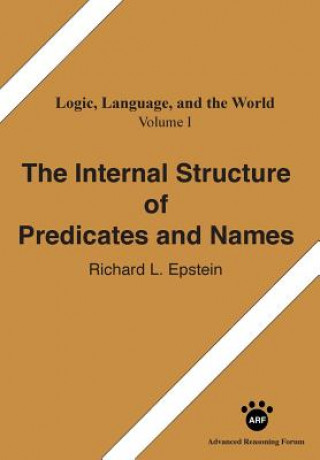
Kod: 15713193
Internal Structure of Predicates and Names
Autor Richard L Epstein
This series of volumes is meant to extend the scope of what we can formalize in classical predicate logic, and in doing so see the real limitations of what can be done. The first section of this volume ... więcej
- Język:
 Angielski
Angielski - Oprawa: Miękka
- Liczba stron: 300
Wydawca: Advanced Reasoning Forum, 2016
- Więcej informacji o książce

Zobacz książki o podobnej tematyce
-

Dune
34.73 zł -33 % -

Haunting Adeline
125.38 zł -1 % -

Berserk Deluxe Volume 2
211.92 zł -1 % -

White Nights
15.25 zł -23 % -

Powerless
48.58 zł -11 % -

Atomic Habits
57.31 zł -28 % -

Dune Messiah
46.17 zł -3 % -

Berserk Deluxe Volume 3
217.44 zł -3 % -

One Day
32.52 zł -36 % -

Berserk Deluxe Volume 1
211.12 zł -2 % -

Iron Flame
60.93 zł -28 % -

Surrounded by Idiots
36.63 zł -28 % -

Harry Potter and the Prisoner of Azkaban (Minalima Edition)
169.86 zł -2 % -

Gravity Falls Journal 3
89.14 zł -

Heaven Official's Blessing: Tian Guan Ci Fu (Novel) Vol. 1
85.32 zł -5 % -

The Creative Act
99.88 zł -15 % -

Dune
47.18 zł -23 % -

Hunting Adeline
126.08 zł -4 % -

A Little Life
46.87 zł -14 % -

Children of Dune
46.57 zł -2 % -

Heaven Official's Blessing: Tian Guan Ci Fu (Novel) Vol. 2
77.49 zł -14 %
Bon podarunkowy: Radość gwarantowana
- Podaruj bon o dowolnej wartości, a my się zajmiemy resztą.
- Bon podarunkowy dotyczy całej naszej oferty.
- Możesz wydrukować elektroniczny bon z e-maila a następnie przekazać go obdarowanemu.
- Ważność bonu wynosi 12 miesięcy od daty wystawienia.
Więcej informacji o Internal Structure of Predicates and Names
Za ten zakup dostaniesz 112 punkty
 Opis
Opis
This series of volumes is meant to extend the scope of what we can formalize in classical predicate logic, and in doing so see the real limitations of what can be done. The first section of this volume presents classical predicate logic with equality. In the second section. that logic is extended to formalize reasoning that involves adverbs and relative adjectives by viewing those as modifiers of simpler predicates. What is normally taken to be an atomic predicate, such as "barking loudly", can then have internal structure. Reasoning that involves conjunctions of terms, as in "Tom and Dick lifted the table", conjunctions of modifiers, conjunctions of predicates, and disjunctions of predicates can also be formalized by viewing them as part of the internal structure of atomic predicates. Many questions about the nature of formalizing arise in doing this. The internal structure of names is the topic of the third and last section. First, names for functions are used in classical predicate logic to form complex names. In our ordinary reasoning we also use descriptions to form functions, such as "the wife of ", and descriptions to form names, such as "the cat that scratched Zoe". To reason with those we can take account of their internal structure by dropping the assumption that every name must refer to a specific thing. The formal systems that are developed here are not just formalisms but are meant to help us understand how to reason well. Many worked examples show how to use them. Those examples also uncover limitations of the formal work. Throughout this series of volumes, the work proceeds by abstracting and creating formal models to formalize reasoning. By paying attention to the process of abstracting we gain insight into why we consider some reasoning to be good and some reasoning bad, and insight also into the deeper assumptions we make about the world on which our judgments rely.
 Szczegóły książki
Szczegóły książki
Kategoria Książki po angielsku Language linguistics Philosophy of language
192.24 zł
- Pełny tytuł: Internal Structure of Predicates and Names
- Autor: Richard L Epstein
- Język:
 Angielski
Angielski - Oprawa: Miękka
- Liczba stron: 300
- EAN: 9781938421310
- ISBN: 1938421310
- ID: 15713193
- Wydawca: Advanced Reasoning Forum
- Waga: 481 g
- Wymiary: 244 × 170 × 16 mm
- Data wydania: 21. December 2016
zadowolonych klientów
Od roku 2008 obsłużyliśmy wielu miłośników książek, ale dla nas każdy był tym wyjątkowym.
Copyright! ©2008-24 libristo.pl Wszelkie prawa zastrzeżonePrywatnieCookies



 21 milionów książek
21 milionów książek Dostawa 10.99 zł
Dostawa 10.99 zł (32) 444 93 66 (8-15.30h)
(32) 444 93 66 (8-15.30h)